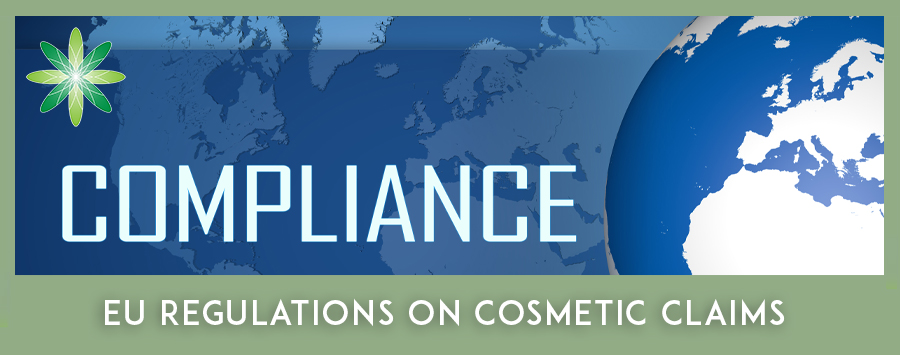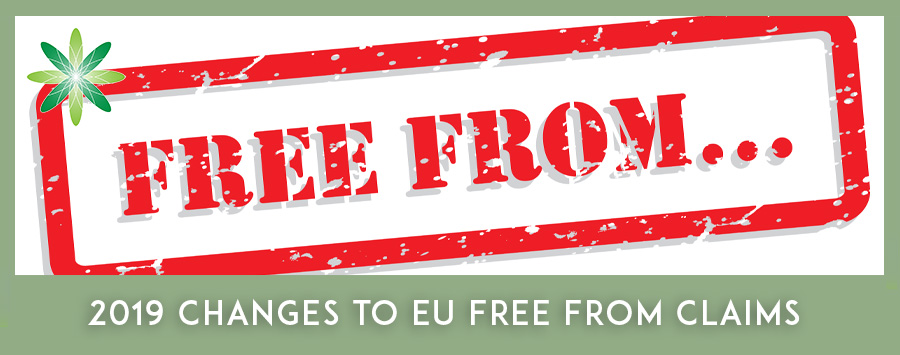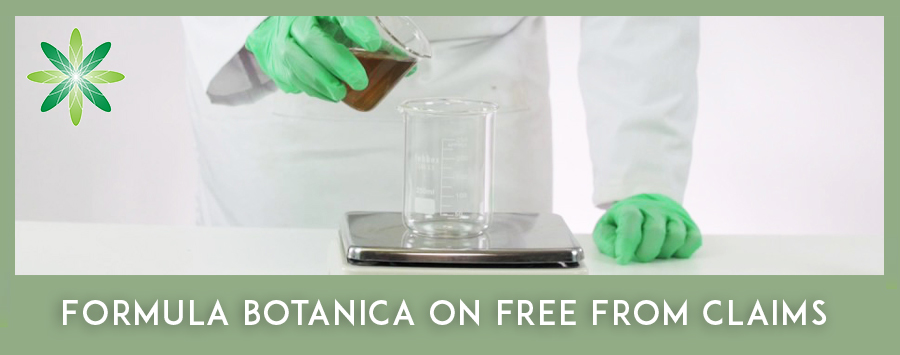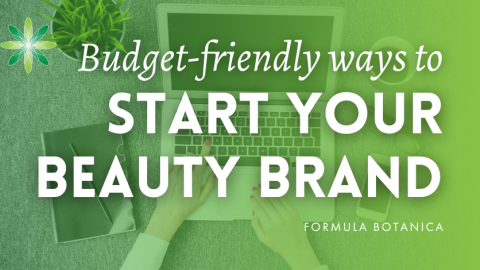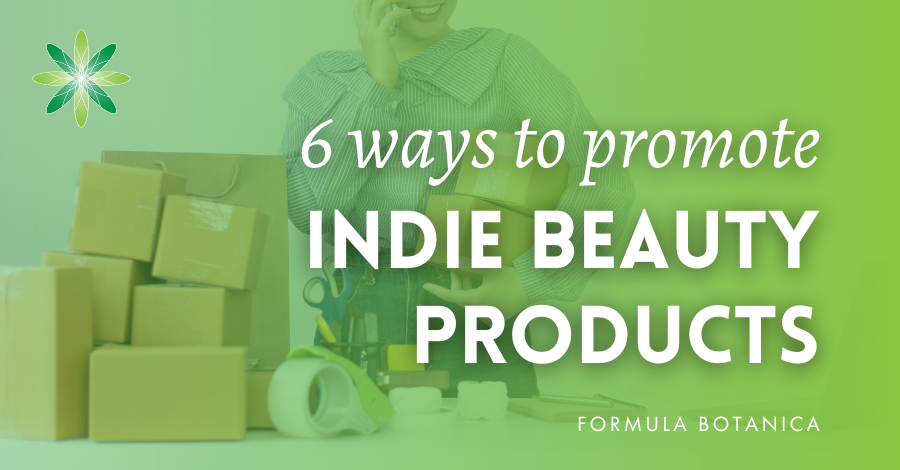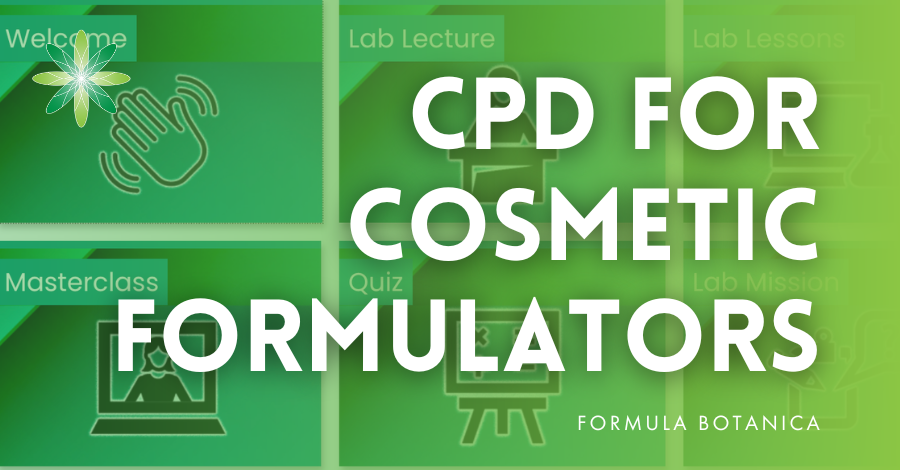Free From claims have been the subject of many heated discussions for a number of years, affecting indie brands and corporations alike. If you’re located in the EU, you’ll be very familiar with the fact that making certain free from claims on cosmetic labels is not allowed. However, did you know that the European Commission published further guidance on free from claims, which came into force in 2019?
In this blog post, we discuss the changes to the EU Free From cosmetic claims, how that will affect indie brands and our philosophy on Free From claims at Formula Botanica.
Cosmetic claims and regulations can be a confusing issue for anyone running their beauty brand. As claims that are allowed vary from country to country, you will need to thoroughly research all the regulations that apply to your business before you start to sell. It is also your responsibility to keep up to date with any changes happening after you launch your brand, as these regulatory changes may affect how you run your business.
Read more:-
Understanding Cosmetic Regulations in Australia
How to handle a FDA Inspection (US)
EU Regulations on Cosmetic Claims
Before we look at the 2019 update, let’s take a look at the regulations that have been in force for the last few years. In 2013, the European Commission published its common criteria for the justification of claims used in relation to cosmetic products. These common criteria follow 6 criteria:
Legal compliance
The EU Cosmetics Regulations do not allow you to indicate that your formulation has been authorised or approved by a competent authority within the EU. Claims which convey the idea that a product has a specific benefit when this benefit is mere compliance with minimum legal requirements shall not be allowed.
Examples of free from claims that are not allowed:
- “This cleanser complies with the requirements of the EU cosmetics legislation” – you cannot make this type of claim, as you are selling this cleanser in the EU and therefore, by default, it is expected to comply with the EU Cosmetic Regulations. You cannot claim a competitive advantage for something that every formulator has to do.
- “This facial serum does not contain hydroquinone” – hydroquinone is banned in the EU, so you wouldn’t be allowed to make this type of cosmetic claim, as no formulations in the EU are allowed to contain hydroquinone.
Truthfulness
It shouldn’t come as a surprise that you’re not allowed to make claims that are untrue. If you make claims that your formulation contains a particular ingredient, then it must be included. But you also cannot extrapolate and claim that your finished formulation has the same properties as an individual ingredient.
Examples of free from claims that are not allowed:
- “This shampoo is sulfate-free” – you cannot make this type of free from claim if your shampoo contains sulfates. (Author note: although this requirement sounds like a no-brainer, it is surprising how often cosmetic brands get their claims wrong!).
- “This face cream contains moisturising aloe vera” – you cannot make this type of cosmetic claim if the finished formulation is not moisturising.
Evidential support
When you make specific claims for your formulations, you have to be able to back them up by adequate and verifiable evidence. If you use scientific studies to make claims, they have to be relevant to your formulation and to the benefits you’re claiming and follow well-designed, well-conducted methodologies (valid, reliable and reproducible), whilst respecting ethical considerations. The level of evidence has to be consistent with the claim you’re making.
If you have a scientific study that provides in vitro evidence (i.e. performed with microorganisms, cells, or biological molecules outside their normal biological context), then you cannot make in vivo cosmetic claims (i.e. whole, living organisms or cells, usually animals, including humans, and plants).
Examples of cosmetic claims that are not allowed:
- “This shampoo contains rosemary and will help with hair regrowth” – if you create cosmetic claims based on a scientific study that says that rosemary can help with hair regrowth, but the study has only been conducted on cells in a petri dish, then you cannot make claims to say that rosemary will help regrow your hair.
Honesty
Similar to the truthfulness criteria, you should also make sure that your cosmetic claims are honest. You cannot electronically manipulate ‘before’ and ‘after’ photos, for instance. However, this part of the criteria is highly nuanced and really requires you to think through the claims you’re making.
Examples of free from claims that are not allowed:
- “This perfume is preservative-free” – you cannot make this type of claim if your perfume contains a high percentage of alcohol, as the ingredient would be functioning as a preservative in the overall formulation.
- “This shampoo makes your hair shine” – you cannot make this type of cosmetic claim if your shampoo needs to be used together with your conditioner to make hair shine. You have to be honest and make it clear that you need both haircare products.
Fairness
Now we come to the most controversial component of the EU’s free from claims regulations, which the majority of natural formulators are unhappy about. Claims for cosmetic products should be objective and should not denigrate the competitors, nor should they denigrate ingredients legally used. This part of the criteria means that you cannot denigrate synthetic ingredients that are legally used throughout mainstream cosmetics.
Examples of free from claims that are not allowed:
- ‘This moisturiser is paraben-free” – you cannot make this type of claim because parabens are ingredients that are allowed to be used in cosmetics, and by stating that your formulation is paraben-free, you are suggesting that it is superior to that of a competitor using parabens.
- “We do not use irritating SLS” – you cannot make this type of cosmetic claim because you are suggesting that SLS is irritating in a competitor’s formulation.
Informed decision-making
Finally, all cosmetic claims shall be clear and understandable to the average end user. Claims are an integral part of products and shall contain information allowing the average end user to make an informed choice. Marketing communications shall be clear, precise, relevant and understandable by the target audience.
More information:
Podcast Episode 3: How to comply with cosmetics regulations
2019 Changes to Free From Claims in the EU
In 2017, the European Commission published a revised version of the guidelines for the application of the common criteria. This new version contains two additional annexes, one on ‘free from’ claims (annex III) and one on the ‘hypoallergenic’ claim (annex IV). This technical document itself is not legally binding, but the common criteria are. In July 2019, the revision came into force.
The changes to the current guidance are a direct result of the EU Cosmetic Claims surveillance undertaken by the EU Commission in 2016. We wrote about this topic at the time and you can read the results in our post: Results of the 2016 EU Cosmetic Claims Surveillance. Free From claims were only a small proportion of the claims looked at in the surveillance by the European Commission and at the time, non-compliance with existing regulations was found to be low. For this reason, we were surprised that there were further changes specifically on the topic of Free From claims.
The main changes with the publication of Annex III are:
Further Free From Guidance
The European Commission has recognised that free from claims form a large part of cosmetic marketing in the EU. They have therefore included a section specifically dedicated to Free From claims and provided more examples of claims that are and aren’t permitted.
Further examples of free from claims that are not allowed:
- “Our conditioner does not contain colourants” – you cannot make this type of cosmetic claim if your conditioner contains an ingredient that belongs to the officially defined group of colourants in the EU Cosmetics Regulations.
- “Our lip balm does not contain preservatives” – you should not make a free from claim for an ingredient that would never be found in your formulation. If you were formulating a lip balm, you would generally not include a preservative as it’s an anhydrous formulation, so this would be viewed as a dishonest free from claim.
- “Our toner is free from allergenic/sensitising substances” – you cannot guarantee that your formulation would not cause a reaction, as anyone can be allergic to anything.
Free From Preservatives
The claim “free from preservatives” is also affected. There was previously a get-out-of-jail card because the EU only recognised preservatives that were listed on Annex V of Regulation 1223/2009, so some cosmetics were claiming to be preservative-free when they used antimicrobials or preservative blends that hadn’t been included in Annex V. The EU Commission now specifically highlights that beauty brands should not be making preservative-free claims, in an effort to promote consumer trust in preservatives.
Our philosophy at Formula Botanica has always been that formulators should be proud of preservation, as this keeps both you and your customer safe.
Read more:-
Everything you wanted to know about natural preservatives
Sixteen point checklist for choosing natural preservatives
Examples of Permitted Free From Claims
According to the guidelines, Free From Claims that allow an informed choice to a specific targeted end user are still permitted. Examples of permitted claims may include “acetone free” nail polish remover, for those wishing to avoid the strong smell of acetone when doing their nails. Other examples would be “free from animal derived ingredients” which would be a permitted claim for a product formulated for vegans, or ‘free from alcohol’ in a mouthwash intended as a family product.
Overall, the guidance encourages formulators to be positive in their marketing. For example, rather than making the claim “free from irritating ingredients”, you can claim that a product is formulated for sensitive skin. The advice is that free from claims need to be evaluated on a case by case basis, so this is something for brands to think about carefully when they are marketing their products.
As this guidance applies Europe-wide, there are differences in how the 2019 revision to free from claims are being implemented in different EU Member States. In France and Germany, the guidance is being enforced in a stricter way. Natural certification body Cosmebio has recently challenged the change in guidance, claiming that Free From claims can be useful for consumers. This is a bold stance and one that supports consumer choice over avoidance of certain ingredients, regardless of whether they are prohibited or not.
The Formula Botanica Position on Free From Claims
All beauty brands must comply with cosmetic claims legislation. We teach all of our students that they must comply with cosmetics regulations in our award-winning online courses and we show them the difference in cosmetic claims requirements globally. However, we still feel that there are some important nuances that are often overlooked when it comes to free from claims.
1. Consumers are not chemists
The overwhelming feeling we’re left with, reading the European Commission’s technical document on cosmetic claims, is that the cosmetics industry assumes that every customer can read an INCI list, which is clearly not the case. In fact, the message we’ve received from the UK cosmetics industry is that, if you have an allergy, you need to learn how to read the label and identify the ingredients that you might be allergic to.
Cosmetic ingredients come in many forms and just because you have an allergy, does not mean that you should be able to understand what every ingredient is and does. Consumers are not chemists and nor should they need to be. We wish that industry had better means for communicating ingredients with consumers, because meanwhile, they are battling against apps, websites, blogs and social media posts that spread like wildfire.
Free from claims are currently a useful tool for customers with certain allergies and we know that reading cosmetic ingredients lists isn’t always easy. That being said, free from claims may well not be the best tool for communicating about particular allergens and, as this is such a large point of contention, perhaps another mechanism may be feasible instead. After all, whilst this group of consumers will only be small, it is still important. For this reason, we feel the industry bodies should acknowledge these difficulties when drafting regulations.
2. Stop singling out indie brands
Free from claims are used industry-wide, from large corporations to smaller indie brands, although it is often indie brands who are highlighted in the (heated) debate, as this is where many of these types of claims originated.
Nonetheless, we feel there should be a level playing field and that indie brands, as well as the big players, must be taken into account when looking at cosmetic claims, so we hope to see the technical guidance enforced fairly. Many of the big players widely use paraben-free and sulfate-free cosmetic claims (on packaging, online, in TV ads, etc.), and it is needs to be recognised by the cosmetics industry that free from claims are ubiquitous and now more than an ‘indie problem’.
3. The difference in international regulations
Whilst the EU is starting to get tougher on free from claims, it should be recognised that other international regulations don’t necessarily have that same focus.
In the USA, the authorities appear to place a greater focus on prohibiting pharmaceutical claims and do not appear to mention specific free from claims anywhere in their claims guidance. You are obviously not allowed to make pharmaceutical claims for your cosmetics anywhere in the world (as you’re making cosmetics, not drugs), but it should be recognised that if the enforcing authorities place a greater focus on preventing pharmaceutical claims, that the logical next step for some beauty brands will be to start making claims for what isn’t in their formulations. Once those brands sell internationally, it will take some effort to ensure that they are getting their cosmetic claims right everywhere.
We are not defending the use of pharmaceutical or misplaced free from claims, but we do think we should spare a thought for the indie brands who struggle to figure out what on earth to say about their formulations, other than “it feels nice on the skin”.
4. Celebrate what’s in your cosmetics
At Formula Botanica, our philosophy has always been that brands should embrace what is in their formulations, rather than what isn’t. In fact, this is a core part of what we teach our students on our award winning courses. We discuss this further in our recent podcast: Should brands formulate for their customers? The conscious consumerism debate.
Unless you are specifically making cosmetics for people with allergies who need to avoid certain ingredients, or catering for any of the examples of free from claims that are permitted, we would like to see the green beauty movement flying the flag for positivity in their formulations – be proud of what’s in your cosmetics, rather than what isn’t. There are so many amazing ingredients out there, let’s talk about how they can have a positive effect on your skin, your hair and your life.
Interested in studying with Formula Botanica? Why not explore our award winning organic formulation courses.
FREE TRAINING
Learn how to become an
Organic Skincare Formulator
FREE TRAINING
How to become an
Organic Skincare Entrepreneur
FREE TRAINING
How to become an
Organic Skincare Entrepreneur
Leave us a comment
Lorraine Dallmeier is a Biologist, Chartered Environmentalist and the CEO of Formula Botanica, the award-winning online organic cosmetic science school. Read more about Lorraine and the Formula Botanica Team.


